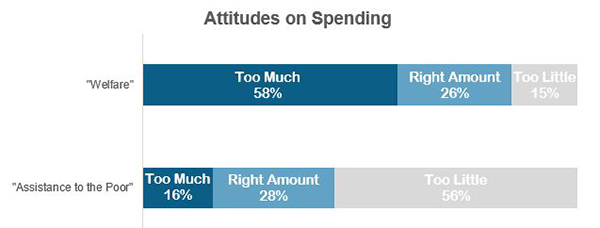If You Want to Expand Our Welfare System, Call It 'Assistance to the Poor'
The term 'welfare' is inescapably tied to race.

Photo Credit: Lee Coursey/Flickr Creative Commons
Last Spring, in a highly publicized meeting with members of the Congressional Black Caucus, President Donald Trump received some startling news. One of the members mentioned to Trump that pushing forward with “welfare reform” would be hurtful to her constituents, “not all of whom are black.”
“Really?” Trump replied. “Then what are they?”
Statistically, they were probably white. But given the United States’ history with the word “welfare,” it’s not all that surprising that Trump was confused.
Despite the fact that white Americans benefit more from government assistance than people of color, means-tested aid is primarily associated with black people and other people of color—particularly when the term welfare is used. For many Americans, the word welfare conjures up a host of disparaging stereotypes so strongly linked to stigmatized beliefs about racial groups that—along with crime—it is arguably one of the most racialized terms in the country.
Martin Gilens, a professor of political science at Princeton University, has studied the relationship between whites’ racial attitudes and their opinion on welfare extensively. In one study, he finds that white people’s racial attitudes are the single most important influence on their views on welfare. In other words, white people who are more prejudiced toward black people are also significantly more opposed to welfare. Numerous studies in the social sciences have substantiated this claim.
That has tremendous consequences for the types of policies that are proposed and passed. Public support for programs associated with the term welfare are generally weaker than support for other programs, like unemployment insurance, primarily because welfare is so strongly linked to the negative attitudes white people possess about black people. However, the public is willing to support redistributive benefits generally when they are not called welfare. For example, in 2014, 58 percent of white people thought that we are spending too much on welfare, whereas only 16 percent reported that we are spending too much on the poor.
These same racial attitudes also structure the way policies are designed. They inform which groups we think are deserving of assistance, and which are not. Nicholas Winter, for instance, notes that part of why Social Security is so relatively popular compared to welfare is because of how both policies are racialized. Social Security, he argues, has been framed as a policy that is both universal—that is, it benefits all groups—and as one that has been contrasted with welfare as an earned reward for hard work (stereotypes associated with white people), rather than a handout for the lazy and dependent (stereotypes associated with black people).
In contrast, negative beliefs about the beneficiaries of programs we think of as welfare have arguably lead to a system of surveillance and sanctions. After Reagan popularized the disparaging stereotype of the ‘welfare queen’ in the 1980s, Bill Clinton passed welfare reform policies that restricted access to benefits to satisfy racist attitudes. In addition to placing significant and often unfair burdens on the individuals seeking assistance, these restrictions—like required drug-testing of program applicants, restrictions on where benefits can be spent, and specifications on what types of work count toward required hours—relied on stereotypes and reinforced the belief that beneficiaries of these programs are undeserving. According to work by Joe Soss and Sanford F. Schram, more people believed that welfare benefits lead to dependency in 2003 than in 1989.
The media have played a significant role in establishing the link between poverty, welfare, and race in the public mind. According to Gilens, these trends were forged in the 1960s, when race riots drew the nation’s attention to the black urban poor. In just three years—from 1964 to 1967—the percentage of poverty news stories that featured images of black people grew from 27 percent to 72 percent. These trends have persisted in the present day.
But both Gilens’ and Winters’ work suggests that the media can also help promote anti-poverty legislation by avoiding racialized terms, like welfare, to talk about public assistance. But if they keep leaning specifically on the term welfare—as they have during Speaker Ryan’s recent push to cut anti-poverty programs by referring to them as “welfare reform”—then otherwise popular policies may be dragged down with the word’s racialized history.


0 Comments:
Post a Comment
Subscribe to Post Comments [Atom]
<< Home